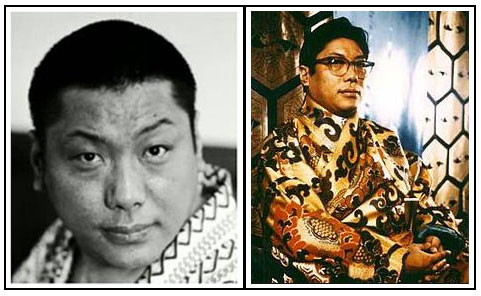"Cutting Through Spiritual
Materialism"
Chogyam Trungpa (1973)
Overview Summary

Spiritual
Materialism
Spiritual Materialism or Spiritual narcissism
are terms used to describe mistakes spiritual seekers commit which turn the pursuit of spirituality into an ego
building and confusion creating endeavor. This is based on the idea that ego development is counter to spiritual
progress. Chögyam Trungpa coined the term spiritual materialism with his book ‘Cutting Through Spiritual
Materialism’ from talks explaining Buddhism given while opening the Karma Dzong meditation center in Boulder,
Colorado.
Conventionally, it is also used to describe
capitalist or commercial efforts such as "new age" bookstores and wealthy lecturers on spirituality. Also it might
mean the attempt to build up a list of credentials or accumulate teachings in order to present oneself as a more
realized or holy person. Author Jorge Ferrer equates the terms, though others draw a distinction that spiritual
narcissism is believing that one deserves love and respect or is better than another because one has accumulated
spiritual training instead of the belief that accumulating training will bring an end to suffering.
In Trungpa's presentation, spiritual materialism can fall into three categories —
what he calls the three "Lords of Materialism" (Tibetan: lalo literally "barbarian") — in which a form of
materialism is mistaken to bring long term happiness but instead only brings short term entertainment, followed by
longer term suffering:
1) Physical
Materialism
Physical Materialism is the belief that possessions can bring release from suffering.
In Trungpa's view, they may bring temporary happiness but then more suffering in the endless pursuit of creating
one's environment to be just right. Or on another level it may cause a misunderstanding like, "I am rich because I
have this or that" or "I am a teacher (or whatever) because I have a diploma (or whatever)."
2) Psychological Materialism
Psychological Materialism is the belief that a particular philosophy, belief system, or point of
view will bring release from suffering. So seeking refuge by strongly identifying with a particular religion,
philosophy, political party or viewpoint, for example, would be psychological materialism. From this the
conventional usage of spiritual materialism arises, by identifying oneself as Buddhist or some other label, or by
collecting initiations and spiritual accomplishments, one further constructs a solidified view of ego. Trungpa
characterizes the goal of psychological materialism as using external concepts, pretexts, and ideas to prove that
the ego-driven self exists, which manifests in a particular competitive attitude.
3) Spiritual
Materialism
Spiritual Materialism is the belief that a certain temporary state of mind is a
refuge from suffering. An example would be using meditation practices to create a peaceful state of mind, or using
drugs or alcohol to remain in a numbed out or a blissful state. According to Trungpa, these states are temporary
and merely heighten the suffering when they cease. So attempting to maintain a particular emotional state of mind
as a refuge from suffering, or constantly pursuing particular emotional states of mind like being in love, will
actually lead to more long term suffering.
Ego
The underlying source of these three
approaches to finding happiness is based, according to Trungpa, on the mistaken notion that one's ego is inherently
existent and a valid point of view: “The problem is that the ego can convert anything to its own use, even
spirituality. Ego is constantly attempting to acquire and apply the teachings of spirituality for its own
benefit…Our vast collections of knowledge and experience are just part of ego’s display, part of the grandiose
quality of ego. We display them to the world and, in doing so, reassure ourselves that we exist, safe and
secure, as “spiritual” people”.
The message in summary is, ‘Don't try to reinforce your ego through material things,
belief systems like religion, or certain emotional states of mind’. In his view, the point of religion is to show
you that your ego doesn't really exist inherently. Ego is something you build up to make you think you exist, but
it is not necessary and in the long run causes more suffering. Thus, an enlightened view of spirituality
would be: “doing good for others without expecting applause”.
In Psychology Today, Michael J. Formica writes,
"Spiritual materialism is that process by which the ego grasps at the accomplishments and progress of the self upon
the spiritual path; an act by which its very nature denies the Self."
Hence, spiritual materialism is the act of
seeking spirituality for the sake of being spiritually accomplished, so that this spirituality acts to secure the
ego more, rather than to help see through it.
z
| 